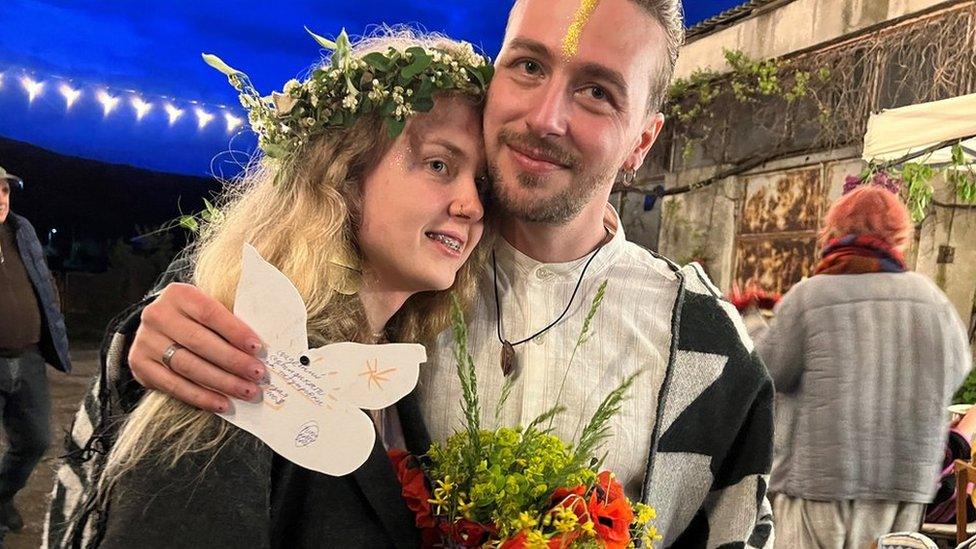Ukraine war: Families risking all to escape through Russia to Georgia
- Published
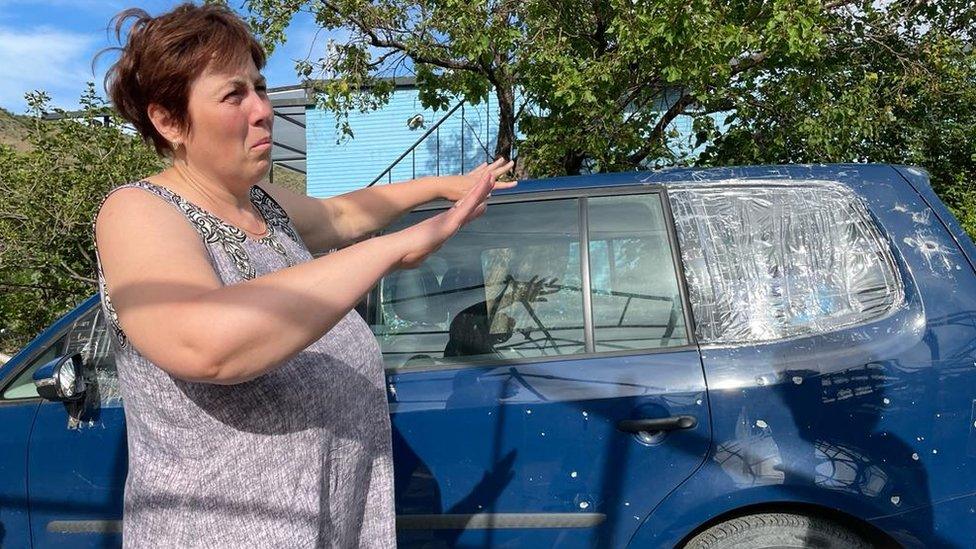
The two cars that took Natasha and her family to Georgia were badly damaged by the fighting
At a house outside the Georgian capital Tbilisi, Natasha shows us two cars riddled with shrapnel holes. She and her family drove them all the way to safety in Georgia from their devastated hometown of Mariupol in Ukraine - a dangerous route that took them right through Russia itself.
"A fragmentation bomb," she says, gesturing to the damaged vehicles. "A drone was flying around dropping them."
Most Ukrainian refugees head west to escape the Russian advance, aiming for Ukrainian-held lands or the safety of the EU.
But others have done the unthinkable and headed towards the invaders. Natasha and her family are among hundreds who have driven into Russia and then onto a third country - risking arrest at border crossings and dozens of checkpoints by passing into the nation that invaded their homeland.
Some make the journey on their own, like Natasha. But others pay private drivers or rely on volunteers to ferry them through enemy territory. From Ukraine they either head directly east into Russia, or they drive south, through Crimea - occupied by the Russians since 2014 - and then onto the Russian mainland.
The BBC has spoken to people and groups who have helped to organise these escapes. To protect the safety of the refugees who make the journey and those helping them, details of the routes and the drivers will not be revealed.

Oleksandr is a sailor from Mariupol. On the morning of the invasion his brother-in-law's family fled their home for the port city. Half an hour after they arrived, the family heard the first explosions far in the distance. His relations immediately decided to leave the area and escape to central Ukraine.
"It was before they even finished their tea," Oleksandr says. "I expected [the war] to be like 2014 - a little bombing, a little talking, after that - shake hands and stop. That was my big mistake."
Oleksandr, his wife Nadia, and their two sons Vlad and Dmytro stayed in Mariupol for months. They sheltered in the basement of their apartment block as the Russians pounded the city with artillery and bombs, venturing out only to cook on a grill. They had to use a corner of the basement as a communal toilet; after months underground, only 40 or so of the 120 people who first went down into the shelter remained there alive.
The 42-year-old says they heard nothing about evacuations and received no aid during their time in the city. There was no internet or phone service, but occasionally messengers would come from other parts of Mariupol, and he began to ask about a way out for him and his family.
Eventually they found a driver willing to drive them to Berdyansk - a Ukrainian city southwest of Mariupol occupied by the Russians. At $50 (£40) a head it wasn't cheap. But on 18 May, nearly three months after the invasion began and the day after the city fell to the invaders, they set off in a Ford Transit van to escape.
Getting there would not be easy for Oleksandr's group. Going from Mariupol to Berdyansk, they had to pay their driver extra to avoid checkpoints, as they hadn't gone through filtration - the Russian screening process for people trying to leave the area. The BBC has written before about Ukrainians who have passed through the system.
Dmytro was also in the car with Oleksandr. He was the only one who had gone through filtration, when he lived outside Mariupol; he and his family slept on folding cots in the basement of a school for six weeks until their turn for filtration came - conditions he called "luxury" compared to what others had to endure. The 33-year-old says those who paid could go through the process faster.
"We had water, we had flour, eggs, food. But we had no idea how long we'd be there [in the school]," he says. "So we had to stay hungry. We ate one meal a day."
When his turn for filtration came they queued at a command post for 14 hours until the Russian forces finally interviewed him. Earlier that week he had fallen from his bike and bruised his knees - something the interviewers found suspicious, thinking he may have been a soldier. They stripped him and checked for tattoos and marks on his shoulder, where a rifle butt may have made bruises.
But he says he was able to pass the process quickly, despite all the waiting. He was fingerprinted and given an official slip showing he had gone through filtration.
"The Russians told me: 'You can eat your passport, it doesn't matter. This matters.'" Dmytro says.
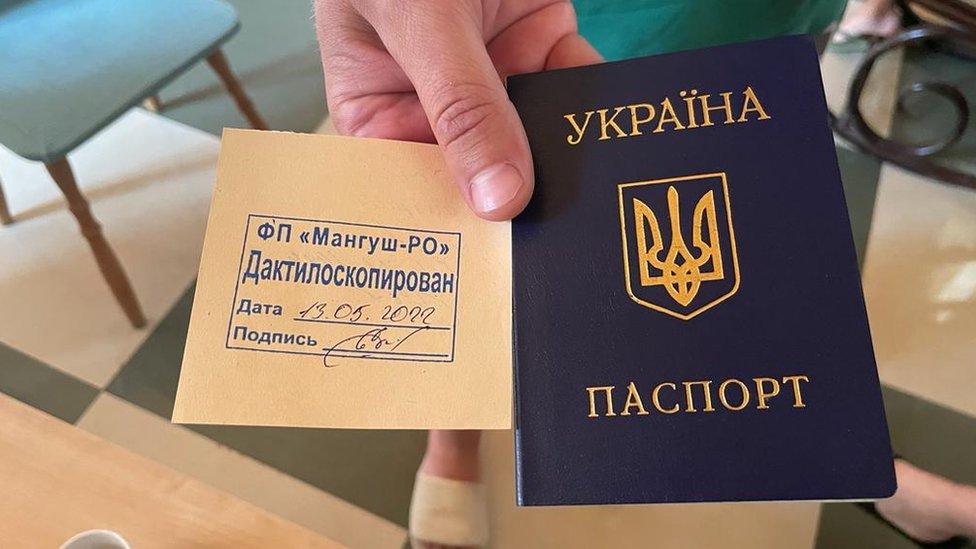
A filtration slip saying Dmytro was fingerprinted at Manhush, a village about 20km (12 miles) west of Mariupol, on 13 May
The driver, however, managed to get the group safely to Berdyansk, driving down back streets, off road, and even through forests to avoid checkpoints to make it to the city.
Oleksandr says that after months in Mariupol, for them Berdyansk was a dream. They could sleep, relax and buy food. But they didn't feel safe under occupation.
"Russian soldiers everywhere. You're constantly under stress," he says. "They can catch you and do anything they want with you. Even shoot you, and [for them it's] no problem."
Oleksandr managed to make contact with a network of private drivers, who agreed to take him, his family and their friends to Georgia - via Crimea.
Others the BBC spoke to also made the journey to Georgia by driving through Crimea. Some have even travelled north from Crimea to the Baltic states, driving hundreds of miles through Russia to safety.
On 24 May, Oleksandr, his wife and children, and Dmytro set off for Crimea from Berdyansk, aiming to reach Georgia. They all knew the dangers of the route - after months under Russian attack, driving further into Russian-controlled territory represented a huge risk. But going deeper into enemy territory felt safer than risking a trip across the frontlines towards Ukrainian-held land.
Another person who made the journey to Georgia via Crimea told the BBC he had decided to take the route through Russia because the roads towards Ukrainian territory were mined.
"It was terrible," Oleksandr says. On the road to Crimea they passed 18 checkpoints, and were questioned at everyone. "Each one, they open up the car. Where are you going? Why are you going? Why aren't you in the army? Everywhere the same questions, everywhere Russian soldiers. Check, check, check, check."
But the worst was to still to come.

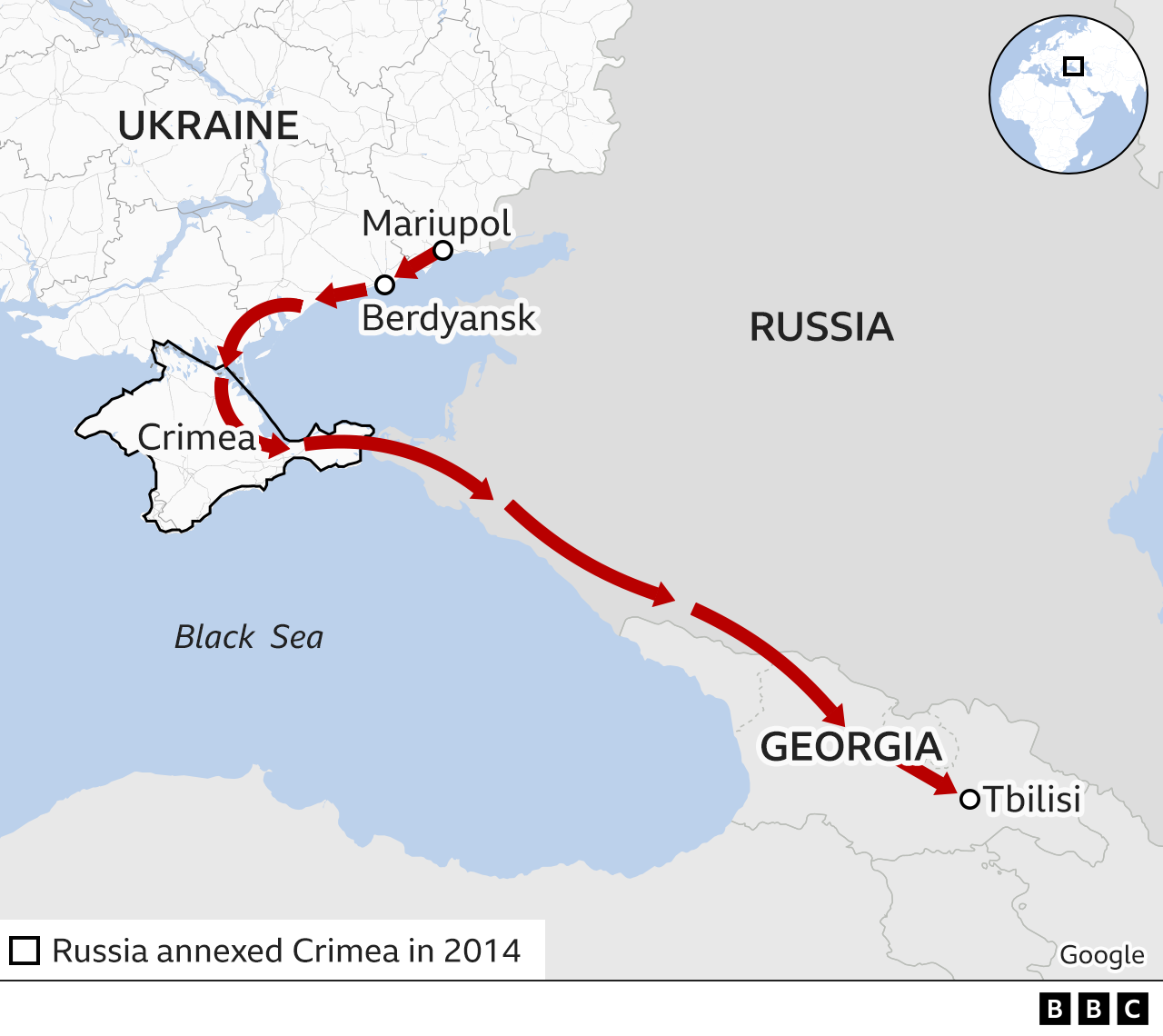
It took the group three days to travel from Berdyansk to Georgia, through occupied Crimea and Russia

After hours of checks on the road south, they arrived at the crossing into Crimea. Nadia and the boys passed quickly through the checkpoint. But the guards took Dmytro and Oleksandr into a railway carriage. It was divided into small rooms, and the men were placed in separate cubicles. Three Russian soldiers sat in the tiny room with Oleksandr, and two with Dmytro.
"It's like filtration - feels like it," Oleksandr says. He was questioned by agents from the FSB, Russia's security service: Where do you work? Why weren't you in the army? Why aren't you fighting with Nazis? Why do you support Ukrainian soldiers?
The men also checked his mobile phone, and found some pictures of Oleksandr in Ukrainian national dress - leading to even more questions.
"The whole time I'm thinking, I have a family, I should just keep quiet and try to pass this thing," Oleksandr says.
After seven hours they released Dmytro. He joined the others on the Crimean side. But they were still waiting for Oleksandr, with no idea of what was happening to him.
"I felt very bad," Oleksandr says. "How they talk to you… they can punch you, put you under stress. They keep big guys around you for hours then send you outside for 10 minutes to 'have a think' - to think what? What should I say?"
"If you say something wrong - end of story. They could even kill you."
Oleksandr says he tried to avoid provoking them, saying as little as possible. Through the carriage he could hear in another cubicle the sound of a man being beaten. "It was terrible," he says.
Finally, after 12 hours of questioning, he was allowed to go.
"I couldn't believe it. I ran [to the minivan] where my wife and children were sleeping - it was already 1am, 2am. I told the driver, just go," he says.
The driver, in contrast, passed the border point easily. Oleksandr say he was a Russian citizen, who showed his ID and wasn't asked any questions.
"It's just business. They make huge money! To Tbilisi it's very expensive. For seven people, it's almost $2,000 from Berdyansk to Tbilisi," he says.
His wife Nadia, however, praises those who took them on the perilous journey. "Please understand: if it weren't for those drivers, we would still be in Mariupol right now. Nobody offered us a ride - no relatives, no friends, no neighbours. Nobody."
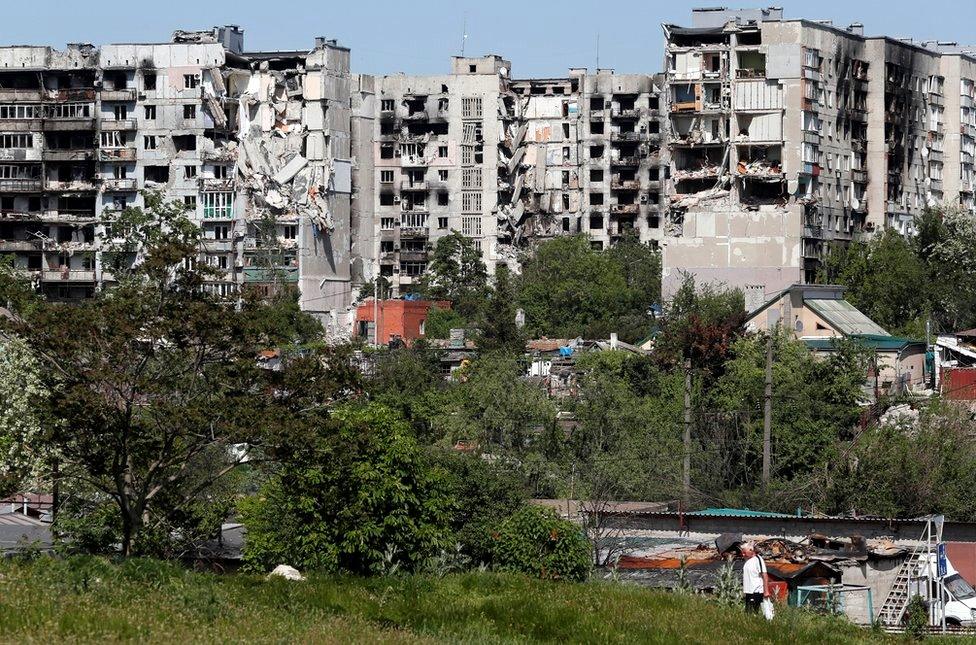
In Mariupol, residential buildings have been heavily damaged by Russian shelling
The group then drove from Crimea into south-eastern Russia, and finally - three days after leaving Berdyansk - to the Georgian border. During their journey, they switched driver - the old one shook hands with the new one as the travellers changed cars at an agreed meeting point, and they continued on their way uninterrupted.
Once inside Russia properly, the drive became smoother. There were fewer checkpoints and the authorities started to treat them with more respect. There was only one checkpoint in Crimea, which they passed easily, and just two more in south-western Russia.
"After [crossing into Crimea], it was very nice," Oleksandr says. "The further you are from Mariupol, Berdyansk, the better." Inside Russia the checkpoints were mostly manned by police, who didn't treat them like "the enemy", Oleksandr says.
Crossing into Georgia, he was once again questioned by the FSB, Russia's main security agency. But he said the process was smoother, and faster - one officer even apologised and said he understood why he left Mariupol, after Oleksandr told him that his mother and brother had been killed in the bombing. On the Georgian side, it was even faster.
"It was the best feeling. It was 4am - [the border guards said] good morning, good morning. Passport stamped. Two minutes. That's all! And we're free. I start shouting in the minivan, we've made it to freedom!" he says. "It was unbelievable. I can breathe."
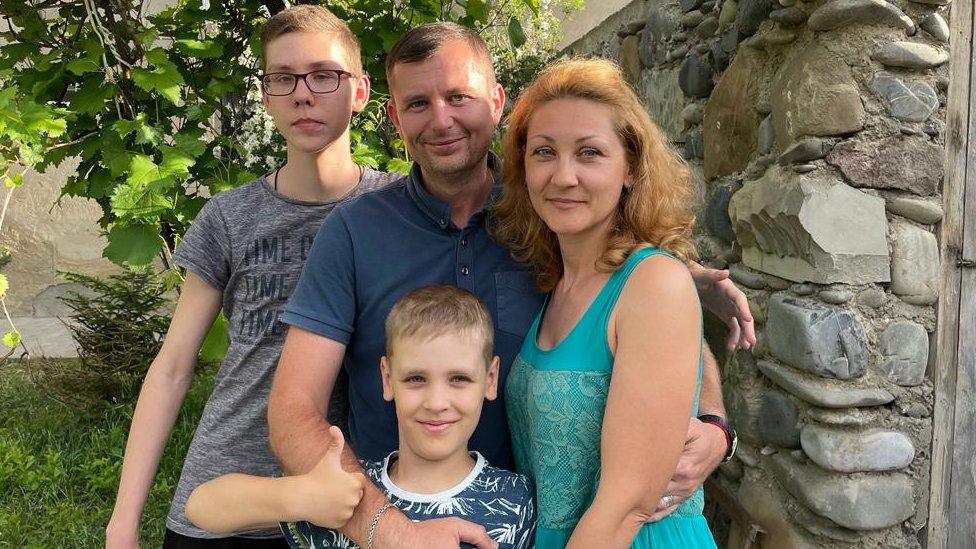
Oleksandr (centre), his wife Nadia (right) and sons Vlad (left) and Dmytro (bottom) at their new house in Tbilisi
Now Oleksandr and his family are staying in a house in the mountains outside Tbilisi, organised for them by aid group Volunteers Tbilisi.
Masha, a Russian from Moscow who moved to Georgia four years ago, set up the group in the first days of the war. Just 20 years old, she remembers calling her Ukrainian boyfriend on the morning of the invasion and hearing him crying down the phone, fearing for his family's safety.
"It was awful. The first days you're in a fog, you don't know what to do. You want to help and do something, but you don't know what."
After a week she began organising aid for Ukrainians. Her parents run a hotel in the city where many Ukrainians were staying, trapped by the start of the conflict, and she realised what they needed to do. Now they have four homes in and around Tbilisi to host Ukrainians who make the journey.
Oleksandr and his family arrived at the house near Tbilisi late at night after their trek through Russia.
"I love it here. Silence. No cars, no explosions," Nadia says. "The boys feel great. They have a river here, mountains, goats and cows."
"It's like paradise," Oleksandr says. "I tell my wife, compare - where we were just one month ago, where we are now. We don't count days now, because we're free. We survived."
Related topics
- Published11 June 2022
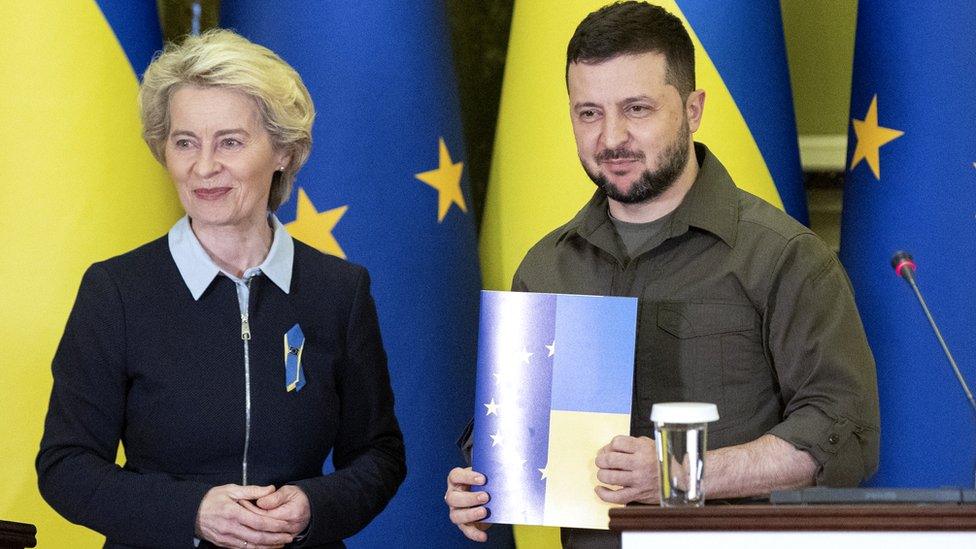
- Published28 May 2022
